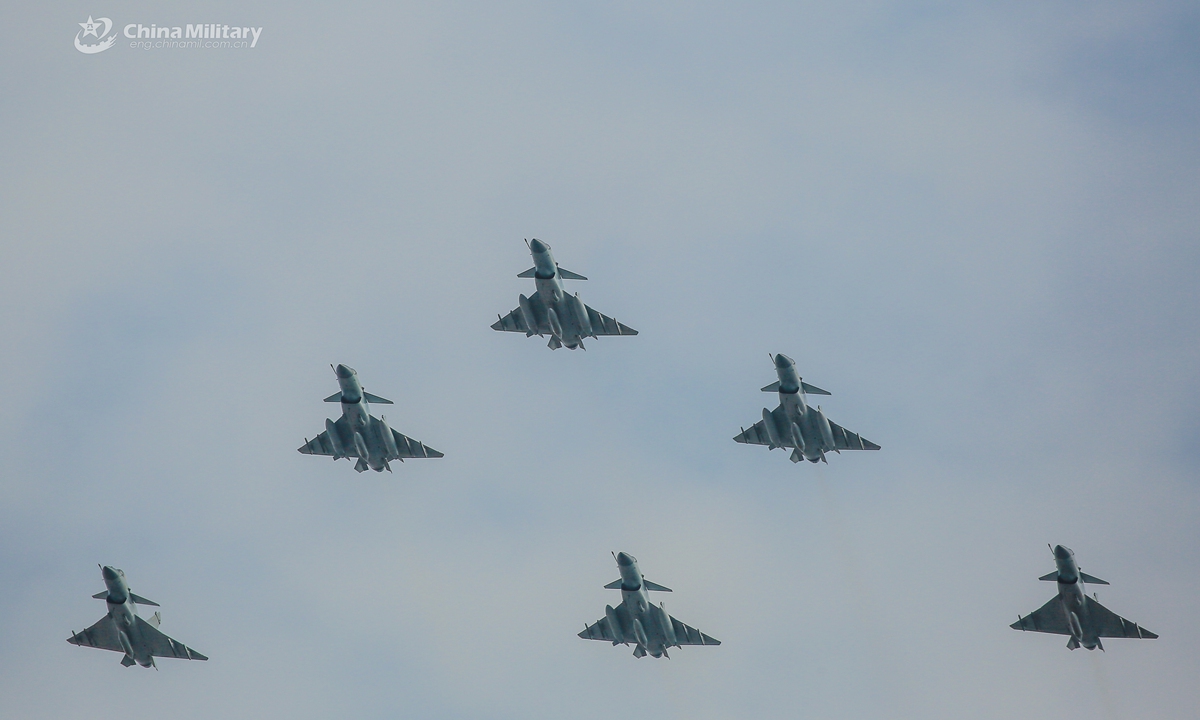
Four pilots and two instructors assigned to an aviation brigade of the air force under the PLA Northern Theater Command fly their fighter jets in delta formation during a flight exam on February 26, 2021. The four pilots have just completed the training on flight combat skills, which focused on aerial confrontation and flexible tactical options, aiming to enhance the flying skills and tactical cooperation among the pilots. Photo: China Military Online
The US Special Operations Command (SOCOM) is losing its anti-terror battlefield and is thus eager to find a new battle ground, and a new target - now it is eyeing the island of Taiwan.Christopher Maier, the nominee to be assistant secretary of defense for special operations and low-intensity conflict, said during a hearing last week that special operators could be sent to the island to instruct local forces on irregular warfare and resisting an "amphibious landing" by the People's Liberation Army (PLA).
Maier said, "If there is a Chinese military advance, there could be some opportunities for resistance networks or other capabilities that we would leave behind against a potential enemy amphibious landing."
Maier's statement can to some extent represent the stance of the SOCOM, which is mainly responsible for coordinating the deployment and missions of special operators. Given that the Pentagon and White House are paying more attention to building up different services - including the upgrading of their main equipment - Maier may want to gain more funding to enhance the service's presence by demonstrating US Special Operation Forces (SOF)'s capability of intervening in the Taiwan question.
The US and the island of Taiwan have conducted joint military training for many years. After the Democratic Progressive Party (DPP) took office, media outlets on the island have been prone to report the trainings publicly. They attempt to create a scenario where Washington will come to help the island if a war breaks out in the Taiwan Straits.
Washington has made various promises to the island - most of them are no more than lip-service. The US didn't even deliver COVID-19 vaccines on time to the island. So, it will unlikely send a large number of combat troops to directly support the DPP authorities with its secessionist intentions.
If the US army gets itself directly involved in a cross-Straits military clash, it would face risk of a huge number of casualties - even the SOF would have to consider the possibility of total annihilation. This will spark a great wave of backlash within the US, which will turn into negative assets for the decision makers in the Pentagon and the White House.
By hyping up the Taiwan question and driving a wedge in cross-Straits ties, the US mainly aims to use the island as a pawn to distract the Chinese mainland. Washington has not, and will not, offer any sincere hand to the island. This means the US will not really help armed forces in the island of Taiwan develop strong combat abilities. In other words, as long as the island constantly purchases weaponry from the US and to some extent hold the PLA in play, the US will get what it wants. As for other issues, Washington prefers to engage with beautiful words.
As a matter of fact, most of Taiwan's main warships are second-hand or old stock that have been eliminated in the US. Also, armed forces in the island of Taiwan are copying tactics from the US, and are trained under the guidance of the US. But they can barely reach basic standards. There have been frequent casualties in training, with various accidents such as the capsizing of landing boat in July 2020, which left three soldiers critically injured.
On the one hand, this can be a result that the US military has made light of the trainings. On the other hand, it is because armed forces in the island of Taiwan are not talented apprentices. The US simply takes the island of Taiwan as a chess piece; so it doesn't want the island to become too militarily strong. After all, this could bring troubles to the US. Meanwhile, some politicians in the island don't speak good of their troops. This results in poor morale of the armed forces in the island of Taiwan.
Nonetheless, the PLA still needs to clearly see through the tricks between the US and the island of Taiwan. The PLA needs to have comprehensive knowledge of the island's military strengths. In this regard, with the help of satellites, the PLA can perceive the deployment of troops and detect the activities of Taiwan warships and submarines in a wide range of waters with advanced equipment - including the Y-8 electronic warfare aircraft and Y-8 anti-submarine warfare aircraft.
Be it combat capabilities or number of troops, the PLA has an absolute advantage in the Taiwan Straits. Therefore, it is not surprising to see Chinese military fans and netizens show their confidence in their jeers toward Maier's statement. However, in the contrast, young Taiwan people are reluctant to join the army. Their morale is also not high. This is a big difference.
The author is a Beijing-based military analyst. opinion@globaltimes.com.cn
